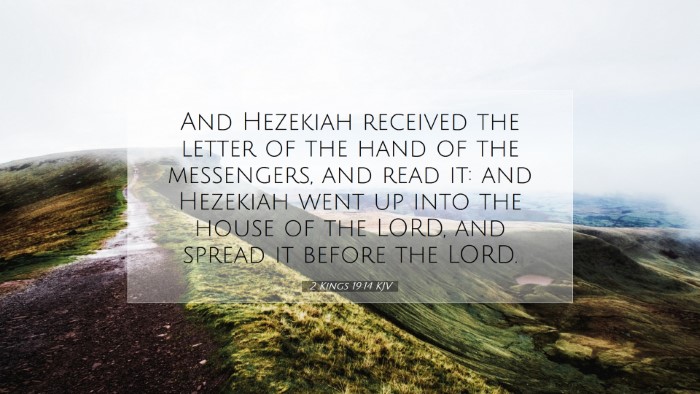Bible Commentary on 2 Kings 19:14
Verse: "And Hezekiah received the letter of the hand of the messengers, and read it: and Hezekiah went up into the house of the LORD, and spread it before the LORD."
This verse encapsulates a critical moment in King Hezekiah's life as he faced an existential crisis for the nation of Judah. His response to the crisis provides lessons applicable for believers today.
Contextual Background
Hezekiah was the king of Judah during a time when the Assyrians posed a significant threat. The verse follows a period of intimidation where Sennacherib, the Assyrian king, sent a letter filled with blasphemies against God and threats against Jerusalem. The historical context is crucial, as Assyrian power was formidable, and many nations fell beneath their might.
Hezekiah's Response
The first critical action taken by Hezekiah was to receive the letter. This indicates a recognition of the threat and acknowledgment of the situation he faced.
-
Acceptance of Reality: Hezekiah did not ignore or dismiss the threat; instead, he confronted it directly.
-
Data Collection: By reading the letter, Hezekiah gathered all necessary information before acting, demonstrating wisdom in leadership.
After reading the letter, Hezekiah went up into the house of the LORD. This act is deeply significant; it illustrates his turning to God in a moment of desperation.
Theological Insights
From a theological standpoint, Hezekiah's actions within the temple signify a profound understanding of where true power and help lies.
-
Divine Dependence: Hezekiah exemplifies the necessary disposition of believers when faced with overwhelming challenges—turning towards God in prayer and supplication.
-
Prayer as Action: Rather than merely calling for immediate human solutions, he sought divine intervention, indicating the centrality of prayer in the life of a believer.
Furthermore, Hezekiah spread the letter before the LORD. This action can be seen as an act of vulnerability and surrender. By physically placing the letter before God, he symbolically articulated his trust in divine sovereignty over the immense challenges posed before him.
Commentary Insights
Matthew Henry notes that Hezekiah's act of spreading the letter was a metaphorical communication of his plight before God, expressing his fear and need for divine help.
Albert Barnes emphasizes the significance of Hezekiah's prayerful attitude and reliance on God's promises during this time of distress, drawing a parallel to the importance of prayer in the believer's life, especially when confronting overwhelming odds.
Adam Clarke remarks on the importance of acknowledging our fears and worries before God. Clarke highlights how Hezekiah’s approach underscores a model for believers, wherein they should lay their burdens before God rather than trying to resolve them through mere human effort.
Application for Pastors and Theologians
For pastors and theologians, this verse encourages a theology of prayer that emphasizes both the urgency and necessity of bringing concerns before God. It challenges them to model a prayerful dependence on God amidst trials, teaching their congregations the importance of honest communication with God.
-
Leadership through Prayer: Pastors are called to be leaders who model prayer lives, especially when navigating crises within their congregations.
-
Encourage Vulnerability: The act of spreading one’s burdens before God encourages an authentic expression of faith and reliance on God.
Conclusion
In 2 Kings 19:14, Hezekiah's response to the letter of threat embodies a profound lesson on faith, resilience, and the importance of divine communication in times of trouble. This verse stands as a reminder for all believers, especially those in leadership, to trust in the sovereignty of God and to lay their burdens at His feet, knowing that He is attentive to their cries for help.


